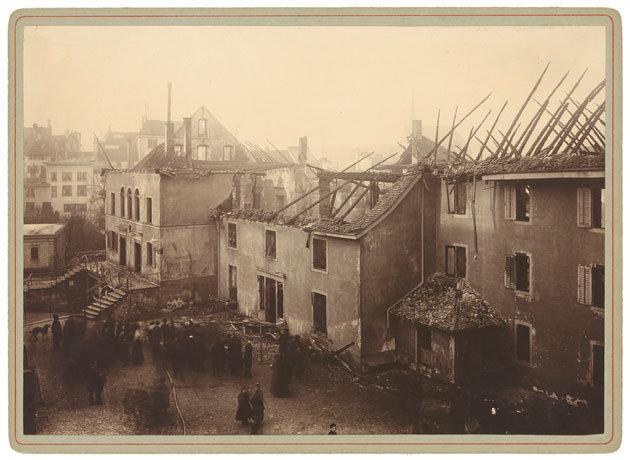The Temple of Thalia
Shortly before ten in the evening on 1 January 1890, the alarm is raised in Zurich: the theatre is on fire! Luckily, the entire audience and cast are able to get to safety in time, but the building and everything in it – including sets, costumes and the valuable theatre library – is completely destroyed. By a twist of fate, the fire interrupts a performance of “The Organ-Grinder and his Foster-Child”, a comedy by Charlotte Birch-Pfeiffer, who was the theatre’s director in its heyday.
28. August 2010 - 10. July 2011
Location
Opernhaus Zürich
Falkenstrasse 1
8008 Zürich
Opening hours
Die Ausstellungen der Zentralbibliothek im Foyer des Opernhauses Zürich werden jeweils eine Saison lang präsentiert. Sie sind während der Öffnungszeiten des Opernhauses frei zugänglich.
Anschliessend sind sie ein weiteres Jahr in der «Musikgalerie im Predigerchor» zu sehen. Die Exponate befinden sich dann im Treppenaufgang zum Lesesaal der Musikabteilung.

The Aktientheater Zürich from its inception in 1834 to the fire in 1890
Shortly before ten in the evening on 1 January 1890, the alarm is raised in Zurich: the theatre is on fire! Luckily, the entire audience and cast are able to get to safety in time, but the building and everything in it – including sets, costumes and the valuable theatre library – is completely destroyed. By a twist of fate, the fire interrupts a performance of “The Organ-Grinder and his Foster-Child”, a comedy by Charlotte Birch-Pfeiffer, who was the theatre’s director in its heyday.
After several attempts to found a theatre were thwarted by conservatives and the Church, the Aktientheater (so called because shares – Aktien in German – were issued to fund it) opened on 10 November 1834 with a gala performance of Mozart’s “The Magic Flute”. Director Ferdinand Deny ushered in this new era with a theatrical flourish: “The hour for which we have longed is come. Behold! The Temple of Thalia bids you welcome.” As was to be expected, the theatre sparked quite a controversy. The right-wing Freitags-Blatt decried the collapse of decency in politically troubled times, while Der Schreiber focused its ire on the injured vanity of the “most snobbish ladies” and the pitiful libretto of “The Magic Flute” by Emanuel Schikaneder. It noted that even the “majestic eagle” Mozart could not rescue the piece’s artistic merit. The more progressive Neue Zürcher Zeitung, on the other hand, welcomed the end of Zurich’s hostility towards the theatre. According to the newspaper, the theatre finally offered men an alternative to “a diet of middle-class banality” in the city’s pubs, and women were no longer condemned to a life of knitting and idle gossip.
However, both Deny and his successor Carl Beurer had little success when it came to turning a profit. It was thanks to Charlotte Birch-Pfeiffer (1800–1868), who had built a great reputation as an actress, that the theatre enjoyed its first great triumph. Born in Stuttgart, she had come to Zurich in 1837 as a guest performer and played the title character’s wife in “The Death of Ulrich Zwingli”, her first play in Zurich. She was so impressive in the role that she was hired as director. Although she remained in charge until 1843, her reign was also cut short by financial difficulties. This proved to be a recurring theme. In 1855, the company even ruled that the theatre was to be liquidated “if annual funding of at least 5,000 francs cannot be raised from the authorities and private investors for the next three years”. The same season, Richard Wagner, who lived in Zurich from 1849 to 1858 and was the Aktientheater’s guest conductor for the 1850–51 season, staged the Zurich première of his “Tannhäuser”.
Wagner encountered a different kind of problem during his time in charge. The members of the AMG Orchestra – amateur musicians aided by a few professionals – had taken on additional jobs at the theatre when it was founded. It became clear that they were overworked as they were often absent and sometimes totally unprepared. Wagner thus saw himself forced to impose a professional rehearsal regime. Only in 1868 did a permanent, professional orchestra become available. With Friedrich Hegar as conductor and Lothar Kempter as musical director, the Tonhalle Orchestra raised opera back to a level not seen since Wagner’s time and earned international acclaim.
The theatre building also became insufficient for modern needs. The city had grown substantially and undergone rapid urban and cultural development. The fire on the evening of New Year’s Day 1890 turned the persistent “theatre problem” into an emergency. The shareholders held an extraordinary general meeting and voted to build a new theatre. The City provided the land and contributed to the cost of construction. No tears were shed for the “unsightly, cramped and draughty old pile”.
Exhibition concept: Angelika Salge, Eva Hanke


